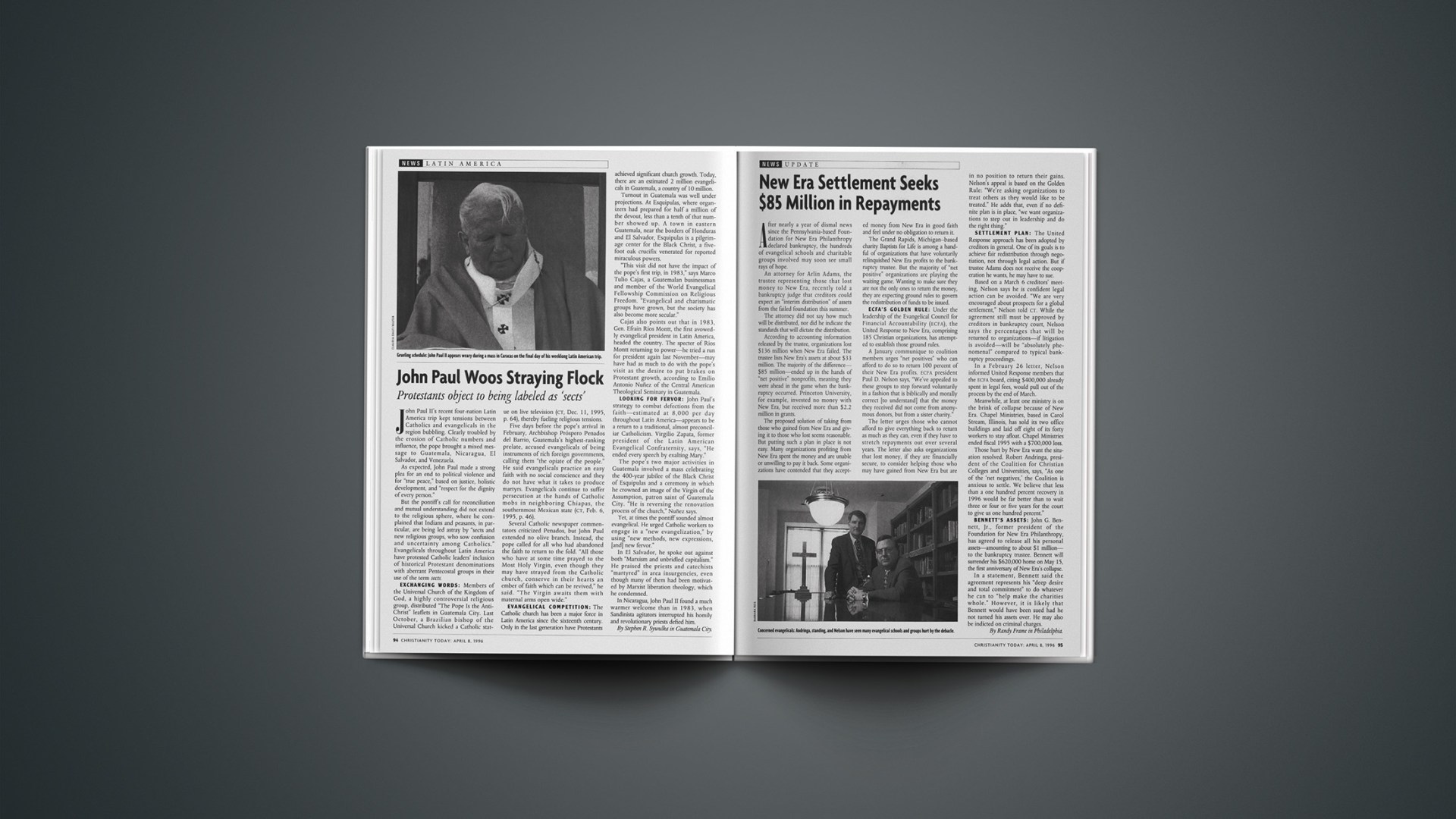John Paul II’s recent four-nation Latin America trip kept tensions between Catholics and evangelicals in the region bubbling. Clearly troubled by the erosion of Catholic numbers and influence, the pope brought a mixed message to Guatemala, Nicaragua, El Salvador, and Venezuela.
As expected, John Paul made a strong plea for an end to political violence and for “true peace,” based on justice, holistic development, and “respect for the dignity of every person.”
But the pontiff’s call for reconciliation and mutual understanding did not extend to the religious sphere, where he complained that Indians and peasants, in particular, are being led astray by “sects and new religious groups, who sow confusion and uncertainty among Catholics.” Evangelicals throughout Latin America have protested Catholic leaders’ inclusion of historical Protestant denominations with aberrant Pentecostal groups in their use of the term sects.
EXCHANGING WORDS: Members of the Universal Church of the Kingdom of God, a highly controversial religious group, distributed “The Pope Is the Anti-Christ” leaflets in Guatemala City. Last October, a Brazilian bishop of the Universal Church kicked a Catholic statue on live television (CT, Dec. 11, 1995, p. 64), thereby fueling religious tensions.
Five days before the pope’s arrival in February, Archbishop Prospero Penados del Barrio, Guatemala’s highest-ranking prelate, accused evangelicals of being instruments of rich foreign governments, calling them “the opiate of the people.” He said evangelicals practice an easy faith with no social conscience and they do not have what it takes to produce martyrs. Evangelicals continue to suffer persecution at the hands of Catholic mobs in neighboring Chiapas, the southernmost Mexican state (CT, Feb. 6, 1995, p. 46).
Several Catholic newspaper commentators criticized Penados, but John Paul extended no olive branch. Instead, the pope called for all who had abandoned the faith to return to the fold. “All those who have at some time prayed to the Most Holy Virgin, even though they may have strayed from the Catholic church, conserve in their hearts an ember of faith which can be revived,” he said. “The Virgin awaits them with maternal arms open wide.”
EVANGELICAL COMPETITION: The Catholic church has been a major force in Latin America since the sixteenth century. Only in the last generation have Protestants achieved significant church growth. Today, there are an estimated 2 million evangelicals in Guatemala, a country of 10 million.
Turnout in Guatemala was well under projections. At Esquipulas, where organizers had prepared for half a million of the devout, less than a tenth of that number showed up. A town in eastern Guatemala, near the borders of Honduras and El Salvador, Esquipulas is a pilgrimage center for the Black Christ, a five-foot oak crucifix venerated for reported miraculous powers.
“This visit did not have the impact of the pope’s first trip, in 1983,” says Marco Tulio Cajas, a Guatemalan businessman and member of the World Evangelical Fellowship Commission on Religious Freedom. “Evangelical and charismatic groups have grown, but the society has also become more secular.”
Cajas also points out that in 1983, Gen. Efrain Rios Montt, the first avowedly evangelical president in Latin America, headed the country. The specter of Rios Montt returning to power—he tried a run for president again last November—may have had as much to do with the pope’s visit as the desire to put brakes on Protestant growth, according to Emilio Antonio Nunez of the Central American Theological Seminary in Guatemala.
LOOKING FOR FERVOR: John Paul’s strategy to combat defections from the faith—estimated at 8,000 per day throughout Latin America—appears to be a return to a traditional, almost preconciliar Catholicism. Virgilio Zapata, former president of the Latin American Evangelical Confraternity, says, “He ended every speech by exalting Mary.”
The pope’s two major activities in Guatemala involved a mass celebrating the 400-year jubilee of the Black Christ of Esquipulas and a ceremony in which he crowned an image of the Virgin of the Assumption, patron saint of Guatemala City. “He is reversing the renovation process of the church,” Nunez says.
Yet, at times the pontiff sounded almost evangelical. He urged Catholic workers to engage in a “new evangelization,” by using “new methods, new expressions, [and] new fervor.”
In El Salvador, he spoke out against both “Marxism and unbridled capitalism.” He praised the priests and catechists “martyred” in area insurgencies, even though many of them had been motivated by Marxist liberation theology, which he condemned.
In Nicaragua, John Paul II found a much warmer welcome than in 1983, when Sandinista agitators interrupted his homily and revolutionary priests defied him.
Copyright © 1996 Christianity Today. Click for reprint information.










